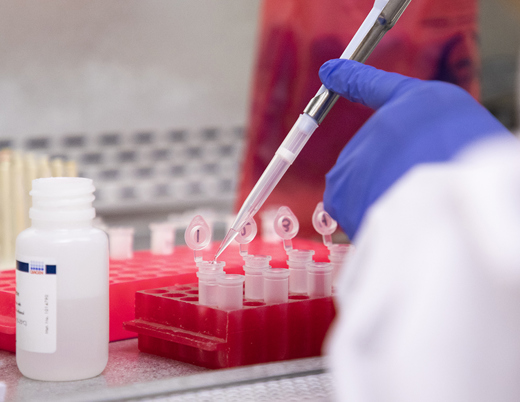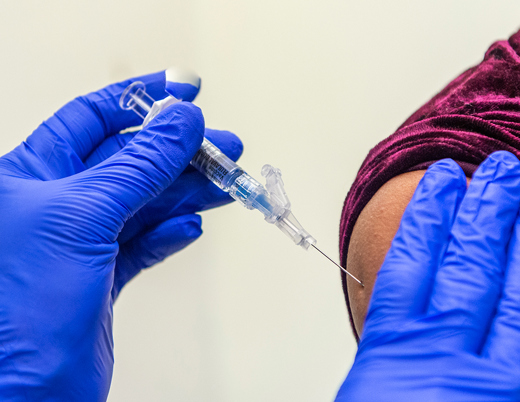Can databasing information about COVID-19 in kids produce key insights about their care?
Before the COVID-19 pandemic, Children’s Hospital Colorado pediatrician Lisa Abuogi, MD, MS, and pediatric infectious disease specialist Christy Smith-Anderson, MD, MS, focused on research and clinical work related to HIV in women and children. Historically, HIV research in children has always lagged behind adults, says Dr. Abuogi. Even today, there aren’t as many treatment options for children.
“And while it might be a little different with COVID-19 in that kids seem to be less affected — at least younger children — we don’t want kids to be left behind in COVID-19 research like they were with HIV,” she says.
In March 2020, as positive cases were on the rise in Colorado, Drs. Abuogi and Smith-Anderson launched a study called Children and COVID-19 in Colorado (The CCC Study) that captures data on every patient diagnosed with COVID-19 at Children’s Colorado.
“There were lots of questions coming up from all over the hospital about what types of kids were getting infected and admitted and if there were any predictors that might signal worse disease in some kids,” adds Dr. Smith-Anderson. “We knew our best shot at answering those questions was with these data.”
A comprehensive coronavirus database
Using software called REDCap, they created a comprehensive database with fields to capture epidemiological information like race, ethnicity, age, underlying medical conditions, symptoms when diagnosed and whether the patient was admitted. Clinically, they capture a wealth of information about a hospital stay, including labs, X-ray findings, medications and outcomes.
The data are acquired through manual chart abstractions from the electronic medical record. It was initially a volunteer effort — Drs. Abuogi and Smith-Anderson along with infectious disease fellow Kelly Graff, as well as a professional research assistant and a few students and residents who offered to help with chart reviews.
After applying for and receiving $75,000 in grant funding from the Children’s Hospital Colorado Research Institute, they’ve added a statistician, two additional professional research assistants, and several more students and pediatric residents.
Analyzing COVID-19 in children
With databasing comes the ability to see information collectively, making it easier to observe patterns.
“We immediately saw a Hispanic and Latino disparity in Colorado kids,” says Dr. Abuogi. “It’s changed a little over time, but at one point, two-thirds of kids who were hospitalized with COVID-19 were identifying as Hispanic versus non-Hispanic. That was way out of proportion for what Children’s Colorado normally sees.”
That finding was the catalyst for an expansion of The CCC Study to explore factors associated with that disparity. Through phone surveys and focus groups — both with Hispanic and non-Hispanic families — the team is working to gain a better understanding of the risk factors and challenges related to following coronavirus prevention approaches. The effort could lead to the creation of an intervention plan to help reduce the risk of COVID-19 in children and help with vaccine uptake when the time comes.
“We also went back and added some fields we realized would be important for geocoding, like zip code and county,” says Dr. Abuogi. “That may help us understand more about how neighborhood characteristics such as socioeconomic status, pollution exposure and availability of public transport impact COVID-19 in children.”
Also on the team’s radar is exploring components including language, primary insurance and obesity — and even whether there are patterns in positive cases related to school openings and closures or remote and non-remote learning options.
Answers in real time
All in all, there are 429 fields the coronavirus database has the ability to capture, making it an extremely valuable resource for anyone seeking answers related to how COVID-19 is affecting kids and how that information can be applied to care.
“We receive at least one request per week to share our data from groups across the Anschutz Medical Campus,” says Dr. Smith-Anderson.
One such request was made by the Children’s Colorado scientific advisory council — a group of multidisciplinary subspecialists who evaluate the latest information on COVID-19 from around the world and influence the hospital’s care policies. The council was weighing how to introduce a new monoclonal antibody for COVID-19 patients with underlying medical conditions.
“They wanted to see the number of kids over the age of 12 who’d been diagnosed with COVID-19 and had symptoms,” she says. “And of those with symptoms, how many had been admitted, how many needed respiratory support and how many had underlying medical conditions.”
Dr. Smith-Anderson and team were able to provide all of those data quickly, allowing the council to make informed decisions on offering the medication and how much of it they might need.
Expanding the scope
Although Children’s Colorado captures much of the pediatric patient population from Colorado and some surrounding states, it's not a complete picture of every child in Colorado who’s been diagnosed with COVID-19. For the rest, Drs. Abuogi and Smith-Anderson have partnered with the Colorado Department of Public Health and Environment, or CDPHE.
CDPHE is the health umbrella for the state — the organization to which local health departments and hospitals are required to report case numbers, contact tracing and other information.
“We have a data-sharing agreement in place,” says Dr. Abuogi. “CDPHE has mirrored our database, and they’re inputting the same information on their end. Eventually, we’ll merge our two data sets. We anticipate this is going to be one of the largest databases of its kind in the country, producing key insights on how COVID-19 affects kids.”
Between The CCC Study itself and the external requests for subsets of data, the database continually serves a variety of efforts working to inform the prevention and treatment of COVID-19 in children.
To contact The CCC Study investigators, email CCCStudy@childrenscolorado.org.
Featured Researchers

Lisa Abuogi, MD, MS
Pediatrician
Pediatric Infectious Disease Program
Children's Hospital Colorado
Associate professor
Pediatrics-Infectious Diseases
University of Colorado School of Medicine

Christy Smith-Anderson, MD, MS
Pediatric infectious disease specialist
Pediatric Infectious Disease Program
Children's Hospital Colorado
Associate professor
Pediatrics-Infectious Disease
University of Colorado School of Medicine





 720-777-0123
720-777-0123










